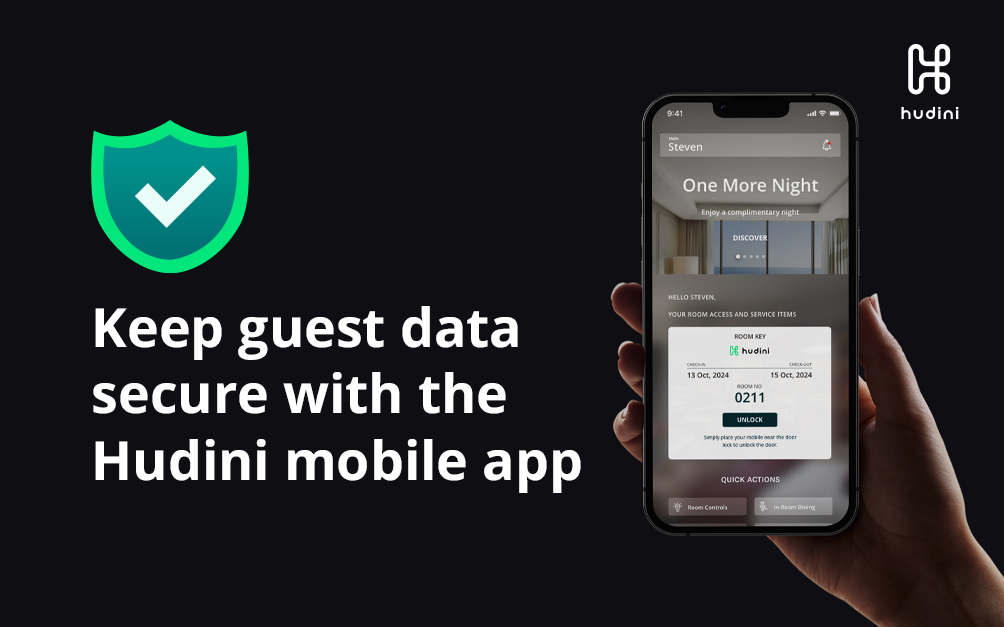Hotel apps are being deployed throughout the hospitality sector, thanks to their ability to personalize and connect every step of the guest journey. This is largely powered by data; hotel apps interact with multiple hotel software systems to create detailed guest profiles, enabling hotels to better serve their guests. The data that apps draw on include Personally Identifiable Information (PII) such as user credentials and payment details.
Naturally, this gives rise to questions about how data is being used and protected. Hotels and their tech partners have a duty to ensure that guest data is confidential and secure. At Hudini, we develop guest experience platforms for the world’s leading luxury hotels; this requires not just cutting-edge data analysis but data protection as well.
We’re guided by SOC2, ISO, GDPR and PCI protocols and also follow other best practices such as regular audits and encryption to protect data. Here’s a look at some of the strategies that we’ve put in place to ensure data security and privacy.
1. Compliance with data protection regulations: Apps developed by Hudini follow protocols such as the General Data Protection Regulation (GDPR) in Europe. This ensures that guests are informed about how their data will be used, given options to manage this usage, and requested for consent before any personal information is collected from them. This makes the hotel’s data policy transparent and while giving guests control over their information.
2. Secure data transmission: It’s essential that data is secured while it’s being transferred to the server, and this is enabled through HTTPS. Hypertext Transfer Protocol (HTTP) is the language in which messages are formatted and conveyed between web browsers and servers. Hypertext Transfer Protocol Secure (HTTPS) is the extra layer of security that encrypts this data while it’s being transferred, preventing it from being intercepted and read as plain text by unauthorized parties.
3. Minimizing data storage: Hudini does not store any data collected from guests on its platform; instead, the data is transferred to the hotel’s servers for storage. This avoids creating multiple banks of guest information and reduces any risk of compromising data.
4. User authentication: Hudini verifies who is accessing the app and its data through an authorization process. For example, the app’s guest interface is synced with the staff dashboards of different departments. Hudini helps hotels control who can access guest information and app functionalities as well as set various levels of access.
5. Verifying third-party vendors: Hotels are dependent on dozens of tech companies for their day-to-day operations.These include payment gateways, booking engines, CRM and PMS vendors, and guest experience platforms. It should be a regular practice to thoroughly vet all partners to maintain data integrity.
Hudini simplifies the process of onboarding new tech companies by featuring 100+ pre-built integrations on its platform. Hudini has partnered with leading companies in the fields of reservations and check-in, in-room services, payments and more, all of whom follow data privacy best practices. This helps hotels deploy our end-to-end guest experience app for various functionalities, assured that their guest data is protected.
6. Regular audits: Hudini carries out security audits to check for vulnerabilities in its platform and address them immediately. This forestalls any security issues from being exploited. We also continuously monitor and update our software to tackle emerging threats and comply with evolving security protocols across regions.
On their part, hotels can also adopt several measures to improve data security and privacy. Staff training is critical so that teams that collect any information from guests, whether it’s at the front desk or the restaurant, are careful about how the data is collected and stored. Additionally, hotels can educate guests about how to keep their data safe and also remind them that hotel staff will never contact them for passwords, PIN numbers and other sensitive information.
Hotels should also walk guests through the app’s privacy features so that they overcome any reluctance about using the app. After all, hotels are reputed not just for their grand gestures, but also for doing the small, everyday things well. For the modern hotel guest, that now includes protecting their data and privacy.
